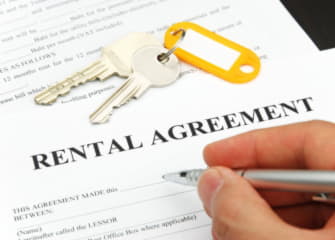
IMAGE SOURCE: GETTY IMAGES.
While it doesn't influence our opinions of products, we may receive compensation from partners whose offers appear here. We're on your side, always. See our full advertiser disclosure here.
The long-awaited stimulus package agreed on by lawmakers over the weekend will provide some relief for desperate Americans.
It also offers a temporary reprieve to millions of renters who could otherwise have faced evictions at the end of the year. The eviction moratorium has been extended until Jan. 31, 2021, and the compromise bill contains $25 billion in rental assistance. Back in September, an order from the Centers for Disease Control and Prevention halted evictions until the end of December for low-income households impacted by COVID-19.
10 million households behind on rent
The extension of the CDC moratorium will no doubt be welcomed by families who feared starting the new year without a place to live. According to the latest data from the U.S. Census Household Pulse survey, over 10 million renter households are behind with their rent. Of those, almost 5 million said they were "very likely" or "somewhat likely" to be evicted in the next two months.
Not only will those families now be protected for another month, they will also receive additional cash. The new bill includes $600 per person in stimulus payments, and an extra $300 a week in unemployment benefits for 11 weeks. In addition, the $25 billion in rental assistance is earmarked for those struggling to get current.
However, experts warn that a lot more help is needed to avoid a housing catastrophe. The eviction moratorium may keep people in their homes for another month, but those renters still need to catch up on their payments. That could be a tall order for those with little in their bank accounts.
The National Low Income Housing Coalition (NLIHC) estimates renters owe between $34 billion and $70 billion in unpaid rent -- meaning the federal rent assistance package will only go so far. Without additional assistance, an eviction moratorium extension only kicks the problem farther down the line.
Homeowners who have paused their mortgages payments by putting their loans in forbearance during the pandemic will not have to catch up on all their payments in one go. Similar protections, however, are not in place for renters. The fear is that by the end of January, those renters could owe large lump sums of back rent.
We could see a "tsunami of evictions"
NLIHC President, Diane Yentel said in a press release, "After enacting these vital resources and protections, it is critical that Congress return in January to continue working on a comprehensive relief package at the scale necessary to prevent a tsunami of evictions and to address the urgent health and housing needs of low-income renters and people experiencing homelessness."
The NLIHC argues that at least $100 billion in emergency rental assistance and housing vouchers are necessary to keep people in their homes. Plus, shelters and homeless charities need additional funding to assist those who are on the streets.
Some states have taken matters into their own hands. For example, an eviction prevention program in Nevada means tenants impacted by the pandemic cannot be evicted through March 2021. Other states have also banned utility shut-offs.
How to avoid eviction
In addition to forcing you to leave your home, a court-ordered eviction could wind up on your credit report. That makes it more difficult to borrow money or find a new place to rent. If you are one of the 10 million renters behind with your payments, you can take steps now to avoid eviction.
- Speak to your landlord. The eviction process is time-consuming and costly. Your landlord may well agree to help you catch up with your rent. You may be able to come up with a payment plan, especially if you've been a good tenant until now. Make sure you get any agreement in writing.
- Look for help. Contact your local housing authority to see what assistance is available. The NLIHC has compiled a list of over 440 rental assistance programs. Pay attention to local news to ensure you're first in line for any rental assistance program in your area. It can feel very lonely when you are struggling to make ends meet, but you don't have to handle this on your own.
- Get informed. Make sure you understand the eviction rules in your state. Your landlord cannot evict you without following the state's eviction process, so take time to learn about it. Contact your local legal aid office to find out what support they offer, and find out whether your state has implemented its own eviction moratorium. If you receive a housing court summons or other formal correspondence, don't ignore it.
Eviction is a scary prospect. And it may feel as if 2020 has already been enough of an uphill struggle. However, this extra month of eviction protection may buy you some time. Use it to apply for housing assistance, get legal advice, and try to get current on your rent.
Top credit card wipes out interest until mid-2022
If you have credit card debt, transferring it to this top balance transfer card can allow you to pay 0% interest for a whopping 18 months! That's one reason our experts rate this card as a top pick to help get control of your debt. It'll allow you to pay 0% interest on both balance transfers and new purchases until mid-2022, and you'll pay no annual fee.
Click here to read our full review for free and apply in just 2 minutes. While it doesn’t influence our opinions of products, we do receive compensation from partners whose offers appear here. We’re on your side, always. See our full advertiser disclosure here.









